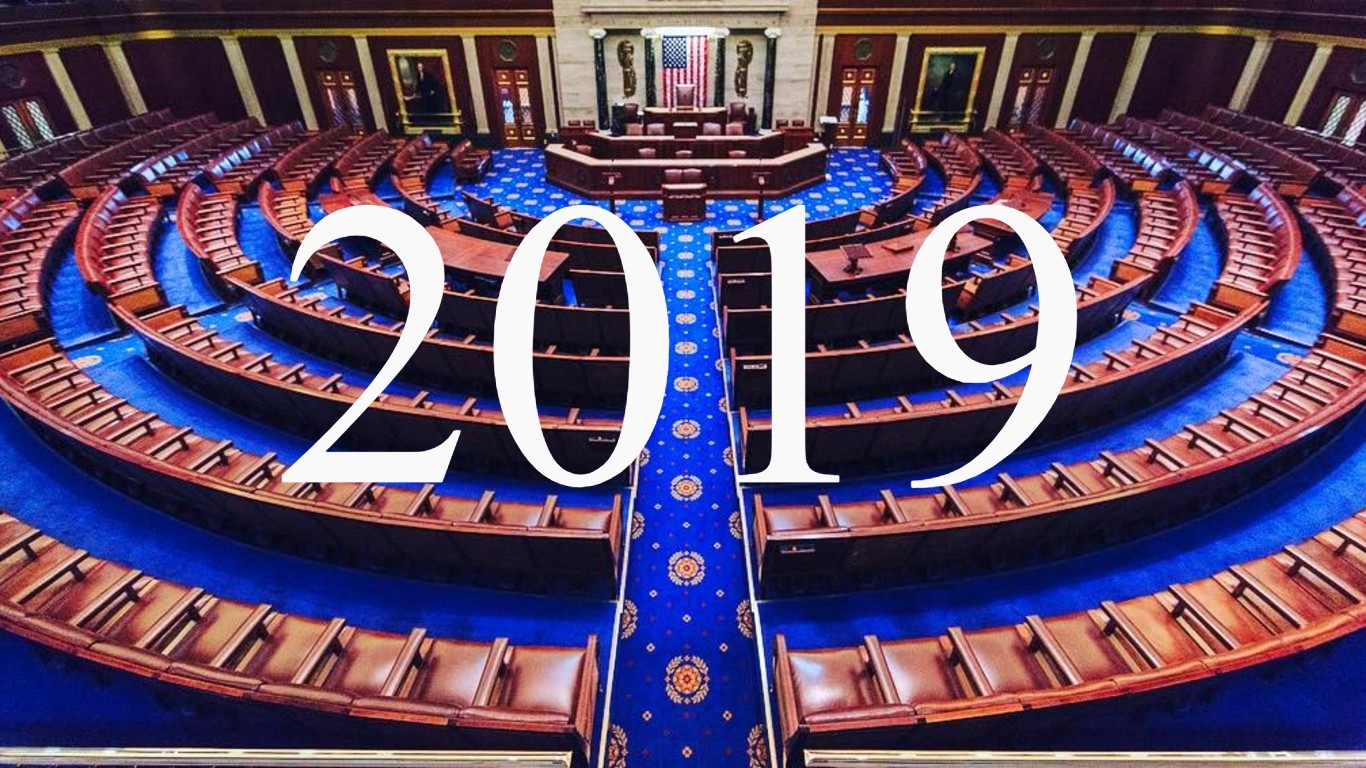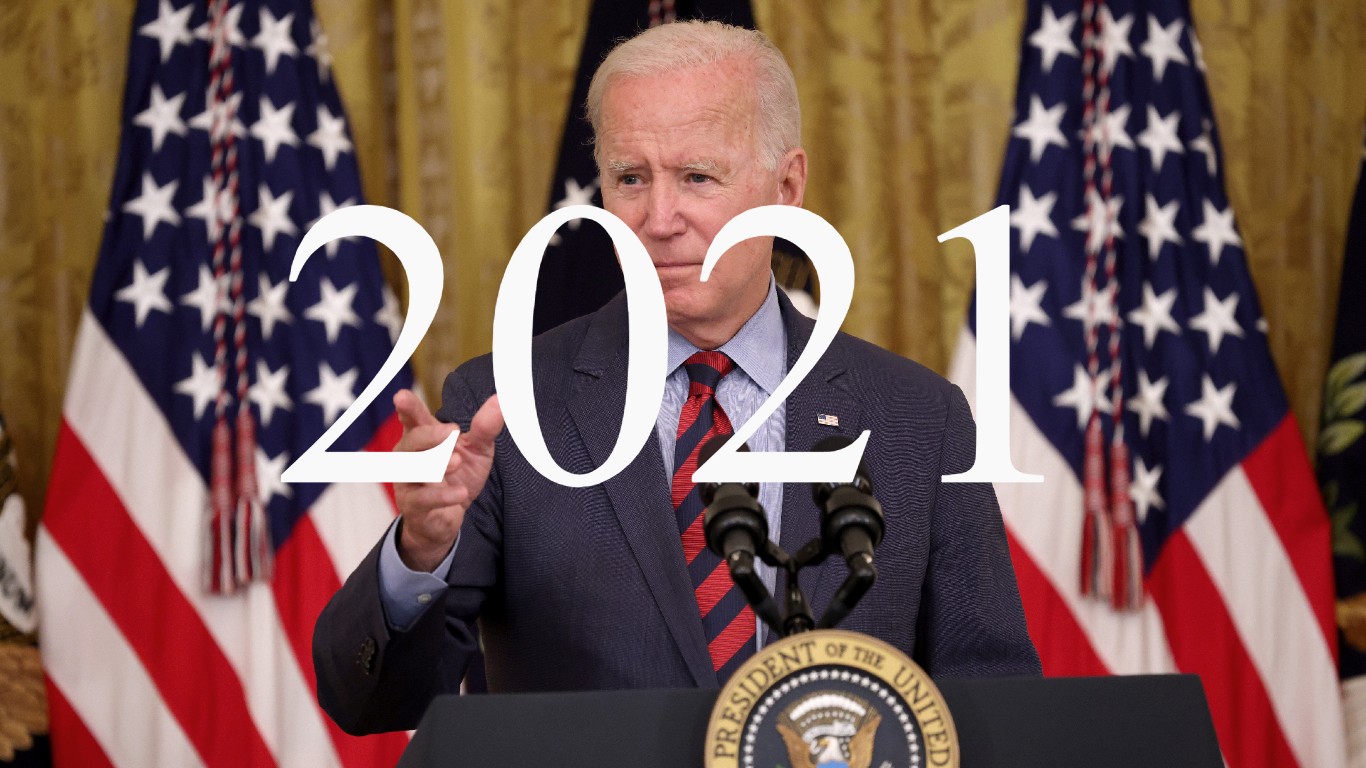Special Report
How Americans Felt About the State of the Nation Every Year this Century

Published:
Last Updated:

Americans are unhappy with the way things are going in the United States, and have been for a while. Something else going on in the United States that is making a lot of people unusually dissatisfied with the direction the country is headed. (It’s worse in some places than in others. These are America’s 18 most miserable states.)
This is more than just a conclusion you might draw from reading the constant stream of outrage emanating from all sides on social media. (Name any issue and online you’ll find plenty of digital graffiti to gratify your beliefs or spike your blood pressure.)
Since 1979, Gallup has been conducting a poll that attempts to determine how Americans feel about the state of the nation each year. Those surveyed were asked: “In general, are you satisfied or dissatisfied with the way things are going in the United States at this time?”
Reviewing the poll data, 24/7 Wall St. determined that around the turn of the century, public satisfaction with the direction the country was headed began to plummet, plunging to a rock-bottom 91% dissatisfaction rate in October 2008, in the 11th month of the worst economic recession since the Great Depression as the U.S. (Data for the 21st century was collected during multi-day stretches of most months every year since 2000. Average sentiment reflects the average share of those polled during the 12-month period who were satisfied and the share who were dissatisfied, rounded to the nearest whole number.)
It’s no surprise that economic strife increases pessimism, but what is distinct over the past 20 years is that when satisfaction rises, it doesn’t reach the peaks of happiness Americans expressed in the mid-1980s and late-1990s. And the number of dissatisfied Americans routinely plunges lower than past valleys of discontent, even during pre-2000 economic downturns. (These are the states with the best and worst economies.)
Click here to see how Americans felt about the state of the nation every year this century.
Social media might not be helping Americans feel good about themselves, or their country. But this polling data suggest the incessant stream of online vitriol and discord is a symptom, not a cause, of America’s 21st-century malaise.

2000
> 12-month average sentiment: 60% satisfied, 37% dissatisfied
> January sentiment: 69% satisfied, 28% dissatisfied
> April sentiment: 59% satisfied, 37% dissatisfied
> July sentiment: 61% satisfied, 35% dissatisfied
> October sentiment: 62% satisfied, 36% dissatisfied
President Bill Clinton’s last year in office began shortly after he signed into law a controversial banking deregulation bill removing FDR-era barriers between banks, securities traders, and insurers. In December, the U.S. Supreme Court halted the Florida recount of the 2000 presidential election and George W. Bush became the first president in over a century to win a U.S. presidential contest despite losing the popular vote. Bush collected about a half-million fewer votes than Al Gore.
[in-text-ad]

2001
> 12-month average sentiment: 55% satisfied, 42% dissatisfied
> January sentiment: 56% satisfied, 41% dissatisfied
> April sentiment: 50% satisfied, 47% dissatisfied
> July sentiment: 51% satisfied, 46% dissatisfied
> October sentiment: 67% satisfied, 29% dissatisfied
The year 2001 will always be identified with the Sept. 11 terrorist attacks, the way the country united (at least temporarily) in their aftermath, and the debate over what the Bush administration and his U.S. intelligence apparatus could have done to avoid the tragic events. Earlier that year, Vermont Sen. Jim Jeffords defected from the Republican Party over his objection to the size of the Bush-era tax cuts. The tax cuts passed anyway.

2002
> 12-month average sentiment: 52% satisfied, 44% dissatisfied
> January sentiment: 65% satisfied, 32% dissatisfied
> April sentiment: 61% satisfied, 37% dissatisfied
> July sentiment: 49% satisfied, 48% dissatisfied
> October sentiment: 47% satisfied, 49% dissatisfied
News that year was dominated by the D.C.-area sniper attacks that killed 17 people over a period of months. The year wound down with President Bush signing the Homeland Security Act, the largest reorganization of the federal government in decades, following the Sept. 11, 2001, terrorist attacks and the subsequent mailing of anthrax spores targeting media professionals and Democratic Party senators, which killed five people.

2003
> 12-month average sentiment: 46% satisfied, 52% dissatisfied
> January sentiment: 42% satisfied, 56% dissatisfied
> April sentiment: 55% satisfied, 41% dissatisfied
> July sentiment: 50% satisfied, 48% dissatisfied
> October sentiment: 41% satisfied, 57% dissatisfied
Global anti-war protests erupted in early 2003 after the Bush administration aimed the U.S. military toward Iraq based on spurious claims that Saddam Hussein had weapons of mass destruction and was in league with the terrorist group Al-Qaeda. In December, Iraqi dictator Saddam Hussein was captured by an elite U.S. special operations squad.
[in-text-ad-2]

2004
> 12-month average sentiment: 43% satisfied, 56% dissatisfied
> January sentiment: 55% satisfied, 43% dissatisfied
> April sentiment: 41% satisfied, 57% dissatisfied
> July sentiment: 41% satisfied, 57% dissatisfied
> October sentiment: 41% satisfied, 57% dissatisfied
Massachusetts Sen. John Kerry won the Democratic Party presidential nomination with North Carolina Sen. John Edwards as his running mate. Kerry would go on to lose to incumbent President George W. Bush. Though Bush lost the popular vote to Al Gore in the 2000 presidential race, this time he garnered three million more votes than his Democratic challenger.

2005
> 12-month average sentiment: 38% satisfied, 59% dissatisfied
> January sentiment: 46% satisfied, 53% dissatisfied
> April sentiment: 38% satisfied, 59% dissatisfied
> July sentiment: 42% satisfied, 57% dissatisfied
> October sentiment: 31% satisfied, 68% dissatisfied
In May, “Big Short” fund manager Michael Burry executed his first tranche of U.S. subprime-mortgage deals, purchasing six credit default swaps from Deutsche Bank for $60 million. The deals were one of the first red flags raised in the coming U.S. subprime mortgage storm rooted in poor government oversight of the subprime mortgages and the derivatives traded on this toxic debt. Meanwhile, a real storm — Hurricane Katrina — struck the Gulf Coast, eliciting deep public criticisms about local, state, and federal responses to the disaster.
[in-text-ad]

2006
> 12-month average sentiment: 31% satisfied, 66% dissatisfied
> January sentiment: 36% satisfied, 61% dissatisfied
> April sentiment: 27% satisfied, 71% dissatisfied
> July sentiment: 32% satisfied, 65% dissatisfied
> October sentiment: 30% satisfied, 68% dissatisfied
In May, President George Bush’s approval rating from Gallup fell to its lowest level up to that point, a decrease attributed to a series of high-profile issues, including his administration’s handling of the Hurricane Katrina disaster, the indictments of White House advisor Lewis “Scooter” Libbey and Texas Republican Tom DeLay, and the ongoing war in Iraq that many Americans felt was turning into a unwinnable and costly quagmire.

2007
> 12-month average sentiment: 28% satisfied, 70% dissatisfied
> January sentiment: 35% satisfied, 63% dissatisfied
> April sentiment: 33% satisfied, 65% dissatisfied
> July sentiment: 27% satisfied, 71% dissatisfied
> October sentiment: 25% satisfied, 73% dissatisfied
The year began with Rep. Nancy Pelosi becoming the first woman speaker of the House of Representatives, and in February, Senator Barack Obama announced his presidential candidacy. Thirty-two people were murdered in May in the Virginia Tech mass shooting by a mentally ill man who had legally purchased his firearms. The U.S. plunged into the Great Recession in December, less than two months after the Dow Jones Industrial Average hit an all-time high.

2008
> 12-month average sentiment: 15% satisfied, 83% dissatisfied
> January sentiment: 24% satisfied, 73% dissatisfied
> April sentiment: 15% satisfied, 83% dissatisfied
> July sentiment: 17% satisfied, 81% dissatisfied
> October sentiment: 9% satisfied, 90% dissatisfied
Stocks plummeted in January over the U.S. subprime mortgage meltdown. Markets plunged again in September as Lehman Brothers, the global financial services firm founded in the mid-1800s, declared bankruptcy due to its exposure in those mortgages. In October, President Bush signed the Emergency Economic Stabilization Act into law, allowing the federal government to purchase troubled bank assets. In November 2008, Barack Obama was elected as the first black U.S. president, beating rival John McCain with a popular vote lead of more than 9.5 million.
[in-text-ad-2]

2009
> 12-month average sentiment: 26% satisfied, 71% dissatisfied
> January sentiment: 13% satisfied, 85% dissatisfied
> April sentiment: 26% satisfied, 69% dissatisfied
> July sentiment: 30% satisfied, 65% dissatisfied
> October sentiment: 26% satisfied, 71% dissatisfied
Barack Obama was sworn in as the 44th U.S. president in January, 14 months into the Great Recession. The worst economic contraction since the Great Depression officially ended in June of the year, but job losses continued to mount, pushing the unemployment rate to 10% by October. It took more than four years for the U.S. to recover the 8.6 million jobs it lost during the crisis.

2010
> 12-month average sentiment: 22% satisfied, 76% dissatisfied
> January sentiment: 23% satisfied, 76% dissatisfied
> April sentiment: 27% satisfied, 71% dissatisfied
> July sentiment: 21% satisfied, 76% dissatisfied
> October sentiment: 21% satisfied, 77% dissatisfied
In March, President Barack Obama signed into law the Affordable Care Act that created a health insurance marketplace; expanded Medicaid eligibility, increasing healthcare access to low-income families in participating states; banned insurers from denying coverage based on pre-existing health conditions; and implemented an annual tax penalty on the uninsured. The Republicans took control of the House and gained six Senate seats and a dozen governorships in the U.S. midterm elections.
[in-text-ad]

2011
> 12-month average sentiment: 17% satisfied, 81% dissatisfied
> January sentiment: 19% satisfied, 78% dissatisfied
> April sentiment: 19% satisfied, 78% dissatisfied
> July sentiment: 16% satisfied, 81% dissatisfied
> October sentiment: 13% satisfied, 85% dissatisfied
A mass shooting in January in Tucson by a mentally ill man who had legally purchased a firearm, killed six and injured 14, including Rep. Gabby Giffords, who survived the attack with permanent brain damage. In May, President Barack Obama announced that U.S. Navy SEALs had killed terrorist mastermind Osama bin Laden. The U.S. raised its debt ceiling in August, leading Standard & Poor’s to downgrade its U.S. credit rating for the first time.

2012
> 12-month average sentiment: 26% satisfied, 72% dissatisfied
> January sentiment: 18% satisfied, 80% dissatisfied
> April sentiment: 24% satisfied, 74% dissatisfied
> July sentiment: 28% satisfied, 69% dissatisfied
> October sentiment: 30% satisfied, 68% dissatisfied
A dozen people were killed and 58 injured in a mass shooting in Aurora, Colorado, in July. Nearly five months later, a 20-year-old gunman murdered six adults and 20 young children at Sandy Hook Elementary School in Newtown, Connecticut, before taking his own life. Gun sales and gun manufacturer stock prices surged after these and other mass shootings. In November, President Obama won a second term, beating Utah Sen. Mitt Romney with a popular-vote lead of nearly 5 million.

2013
> 12-month average sentiment: 24% satisfied, 74% dissatisfied
> January sentiment: 25% satisfied, 71% dissatisfied
> April sentiment: 30% satisfied, 67% dissatisfied
> July sentiment: 28% satisfied, 68% dissatisfied
> October sentiment: 16% satisfied, 82% dissatisfied
In anticipation of her run in the 2016 presidential election, Hillary Clinton resigned from her role as Secretary of State in February and was replaced by John Kerry. In June, the U.S. Supreme Court struck down a section of the Voting Rights Act of 1965 that required states with a history of racial discrimination in voting practices to seek federal approval to change their election procedures. The following day, the high court struck down a section of the Defense of Marriage Act that denies benefits to married same-sex couples.
[in-text-ad-2]

2014
> 12-month average sentiment: 23% satisfied, 75% dissatisfied
> January sentiment: 23% satisfied, 75% dissatisfied
> April sentiment: 24% satisfied, 74% dissatisfied
> July sentiment: 24% satisfied, 73% dissatisfied
> October sentiment: 21% satisfied, 77% dissatisfied
President Obama announced in December that he would normalize diplomatic relations with Cuba. (Key provisions of that effort were to be undone in 2017 by President Donald Trump.) In June, the U.S. Supreme Court ruled that a provision in the Affordable Care Act cannot compel privately held companies to offer health plans that cover birth control.

2015
> 12-month average sentiment: 28% satisfied, 70% dissatisfied
> January sentiment: 32% satisfied, 66% dissatisfied
> April sentiment: 28% satisfied, 70% dissatisfied
> July sentiment: 30% satisfied, 68% dissatisfied
> October sentiment: 25% satisfied, 72% dissatisfied
The 114th Congress convened in January after Republicans took control of the Senate and won the largest majority in the House since before the Great Depression. Voter turnout in the 2014 midterms was the lowest in 70 years. In June, businessman and media personality Donald Trump announced his run to become the Republican nominee for the 2016 presidential election.
[in-text-ad]

2016
> 12-month average sentiment: 27% satisfied, 71% dissatisfied
> January sentiment: 23% satisfied, 76% dissatisfied
> April sentiment: 26% satisfied, 71% dissatisfied
> July sentiment: 17% satisfied, 82% dissatisfied
> October sentiment: 28% satisfied, 70% dissatisfied
President Obama nominated Merrick Garland to replace Antonin Scalia, who died in February, on the Supreme Court, but the move was blocked by Senate Majority Leader Mitch McConnell and fellow Republicans. In March, Obama became the first U.S. president to visit Cuba since 1928. In November, Donald Trump became the second president since the 19th century (after George W. Bush) to win an election without winning the popular vote, falling nearly 2.9 million votes shy of his challenger, Hillary Clinton.

2017
> 12-month average sentiment: 27% satisfied, 70% dissatisfied
> January sentiment: 26% satisfied, 72% dissatisfied
> April sentiment: 32% satisfied, 66% dissatisfied
> July sentiment: 27% satisfied, 71% dissatisfied
> October sentiment: 21% satisfied, 75% dissatisfied
Donald Trump’s first acts as president included executive orders to freeze hiring of non-military federal employees, stop all new research at the Environmental Protection Agency, divert Department of Homeland Security funds toward expanding the border wall with Mexico, and expedite the deportation of unauthorized immigrants. With a Republican federal trifecta, the GOP passed a massive raft of tax cuts in December, including a reduction of the corporate tax rate to 21% from 35%. Filers earning annual incomes of more than $500,000 benefitted the most from the cuts.

2018
> 12-month average sentiment: 34% satisfied, 64% dissatisfied
> January sentiment: 29% satisfied, 69% dissatisfied
> April sentiment: 29% satisfied, 69% dissatisfied
> July sentiment: 35% satisfied, 62% dissatisfied
> October sentiment: 38% satisfied, 59% dissatisfied
Stephanie Clifford, aka Stormy Daniels, alleged in March that she had had sexual relations with Donald Trump in 2006 and was paid $130,000 in return for a nondisclosure agreement. Trump’s attorney Michael Cohen later testified to Congress that he was tasked with paying hush money to Daniels ahead of the 2016 presidential election. Another of Trump’s alleged sexual partners, former Playboy model Karen McDougal, was said to have been paid off by the parent company of the National Enquirer to keep her story from the public, in order to protect the president’s reputation.
[in-text-ad-2]

2019
> 12-month average sentiment: 32% satisfied, 66% dissatisfied
> January sentiment: 26% satisfied, 72% dissatisfied
> April sentiment: 31% satisfied, 67% dissatisfied
> July sentiment: 36% satisfied, 62% dissatisfied
> October sentiment: 28% satisfied, 70% dissatisfied
The 116th U.S. Congress convened after the Democrats regained a majority in the House of Representatives with a net gain of 41 seats, ending the Republican federal trifecta established in the 2016 elections. The GOP gained two Senate seats and held its majority. In April, former vice-president Joe Biden announced his candidacy for the 2020 presidential election.

2020
> 12-month average sentiment: 26% satisfied, 73% dissatisfied
> January sentiment: 41% satisfied, 58% dissatisfied
> April sentiment: 30% satisfied, 68% dissatisfied
> July sentiment: 13% satisfied, 86% dissatisfied
> October sentiment: 28% satisfied, 71% dissatisfied
A period of tepid economic and wage growth, enormous gains in the stock market, and historically low unemployment (a continuation of trends that had begun under the Obama administration) came to an end with the Covid-19 pandemic. Lockdowns to curb the spread of the virus temporarily spiked unemployment to an all-time high and caused a two-month springtime economic recession. In November, Joe Biden beat Donald Trump with a popular vote lead of more than seven million.
[in-text-ad]

2021
> 12-month average sentiment: 29% satisfied, 69% dissatisfied
> January sentiment: 11% satisfied, 88% dissatisfied
> April sentiment: 34% satisfied, 65% dissatisfied
> July sentiment: N/A
> October sentiment: N/A
Joe Biden was sworn in as the 46th U.S. president two weeks after hundreds of Trump supporters ransacked the U.S. Capitol as lawmakers huddled behind closed doors, protected by police officers with guns drawn. Though Republicans did not contest the integrity of the 2016 election — when Hillary Clinton won nearly 2.8 million more popular votes, but lost in the Electoral College — 147 GOP lawmakers voted to overturn the 2020 presidential election based on unsubstantiated claims of electoral fraud after Joe Biden won by 7 million votes.
Finding a qualified financial advisor doesn’t have to be hard. SmartAsset’s free tool matches you with up to 3 fiduciary financial advisors in your area in 5 minutes. Each advisor has been vetted by SmartAsset and is held to a fiduciary standard to act in your best interests. If you’re ready to be matched with local advisors that can help you achieve your financial goals, get started now.
Thank you for reading! Have some feedback for us?
Contact the 24/7 Wall St. editorial team.